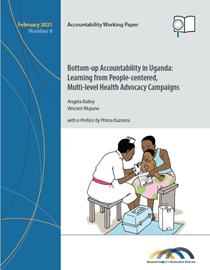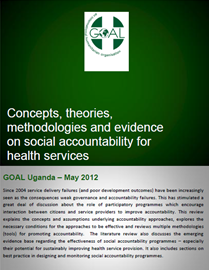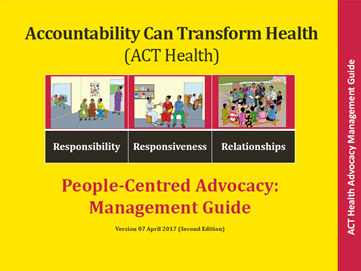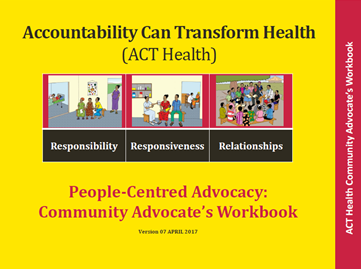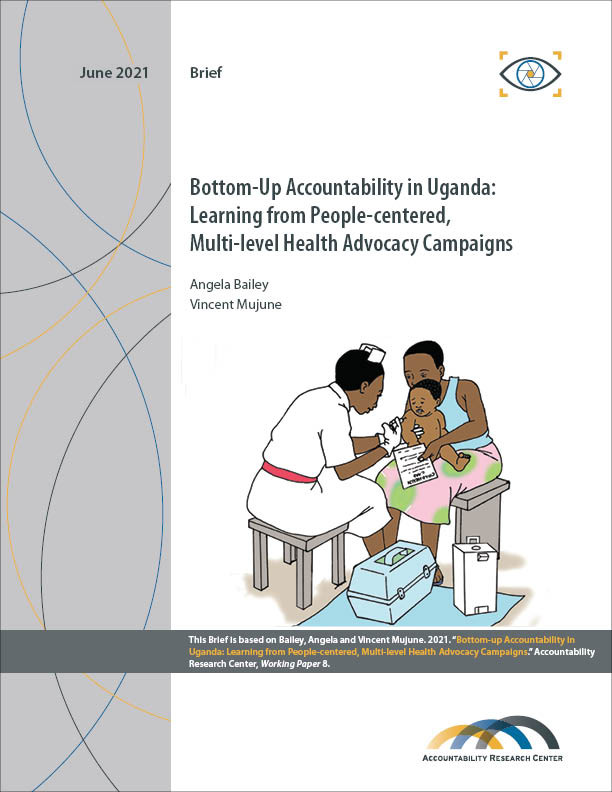
Bottom-up Accountability in Uganda: Learning from People-centered, Multi-level Health Advocacy Campaigns
Date: June 2021
Author(s): Angela Bailey and Vincent Mujune
Publication type: Brief
Published by: Accountability Research Center
This brief analyzes how the Accountability Can Transform Health (ACT Health) program activated bottom-up citizen action to secure government responses and more accountable health services in Uganda. This brief focuses on ACT Health’s “people-centered advocacy” approach which supported almost 400 community advocates representing 98 health facilities to organize, identify joint advocacy priorities, directly monitor health services, and collaborate on health advocacy campaigns in 18 districts.
- Even in contexts dominated by complex political and administrative hierarchies, it is possible to create spaces for citizen–state engagement across multiple levels. Using a people-centered advocacy approach, the Accountability Can Transform Health (ACT Health) program supported almost 400 community advocates to monitor public health services and design advocacy campaigns in 18 districts. Advocates engaged government officials from health workers to district leaders to national line ministries, presenting evidence and voicing demands for change. Through training and cycles of engagement, many community advocates went from being fearful of government authorities to actively questioning gaps in health service delivery.
- Citizen-led engagement engendered a range of responses: government officials in 8 (of 18) intervention districts met or exceeded their commitments to action. While government responses were uneven, they included: increased government monitoring of health centers, increased proactive transparency, countering backlash against advocates, application of sanctions, bolstered budget allocations, and government recognition of advocates.
- Building a bottom-up campaign to engage national-level officials requires time and technical support. The national campaign engagements differed from conventional civil-society organization (CSO) led advocacy efforts because they were grounded in extensive prior mentorship and organizing work in districts including community-level dialogues, followed by citizen-led advocacy campaigns targeting sub-county and district officials. Building from district campaigns, the ACT Health consortium helped community advocates reach national audiences.
- Analysis of the ACT Health program surfaced ways in which citizen-led advocacy stimulated government responses to improve health service delivery. First, community advocates worked to activate subnational governmental checks and balances and improve government oversight at the points of public service delivery. People-centered advocacy campaigns triggered productive synergy between bottom-up (citizen-led) and top-down (state-led) accountability efforts.
- As exciting as the cycles of citizen action and government responses evident in the people-centered advocacy are, induced interventions like ACT Health have limits and risks. Independent monitoring by citizens alone risks placing excessive burdens on those closest to problems, but with the least resources and authority to directly solve them. Nonetheless, strategic support from funders and CSOs can create an enabling environment for horizontal organizing and collective voice, slowly shifting power dynamics between citizens and government. Long-term, iterative and people-centered approaches targeting multiple levels of governance can create conditions for deepening democratic change.
NOTE
This brief is based on Bailey, Angela and Vincent Mujune. 2021. “Bottom-up Accountability in Uganda: Learning from People-centered, Multi-level Health Advocacy Campaigns.” Accountability Research Center, Working Paper 8.

Angela Bailey
Angela Bailey has worked at the Accountability Research Center (ARC) at American University in Washington, DC since 2016. Previously, she worked with GOAL in Uganda as director of the Accountability Can Transform Health (ACT Health) program. Angela holds a Master’s in International Affairs from Columbia University’s School of International and Public Affairs.
Vincent Mujune
Vincent Mujune led GOAL’s people-centered health advocacy work in Uganda from March 2015 to December 2020. Vincent is a member of Uganda’s Civil Society Budget Advocacy Group and has trained civil society actors on people-centered advocacy in Sri Lanka, Malawi, and Sierra Leone.
Positionality
As co-authors, we acknowledge our roles as architects and stewards of the ACT Health program because we understand that our closeness to the work brings strengths and weaknesses to this analysis. As self-critical practitioners committed to learning and advancing participatory governance, our direct experiences with the ACT Health program collaborators, participants, and government officials enable us to highlight many dimensions of this multi-level, people-centered approach and offer valuable insights into the “black box of implementation.”

